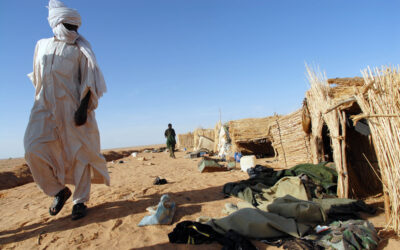
After Saying “Never Again,” Will the World Respond to Genocide in Darfur?
SUBSCRIBER+ EXCLUSIVE REPORTING – Afraid to show his face and wedged into an overstuffed refugee camp on Sudan’s border with Chad, a middle-aged man named […] More
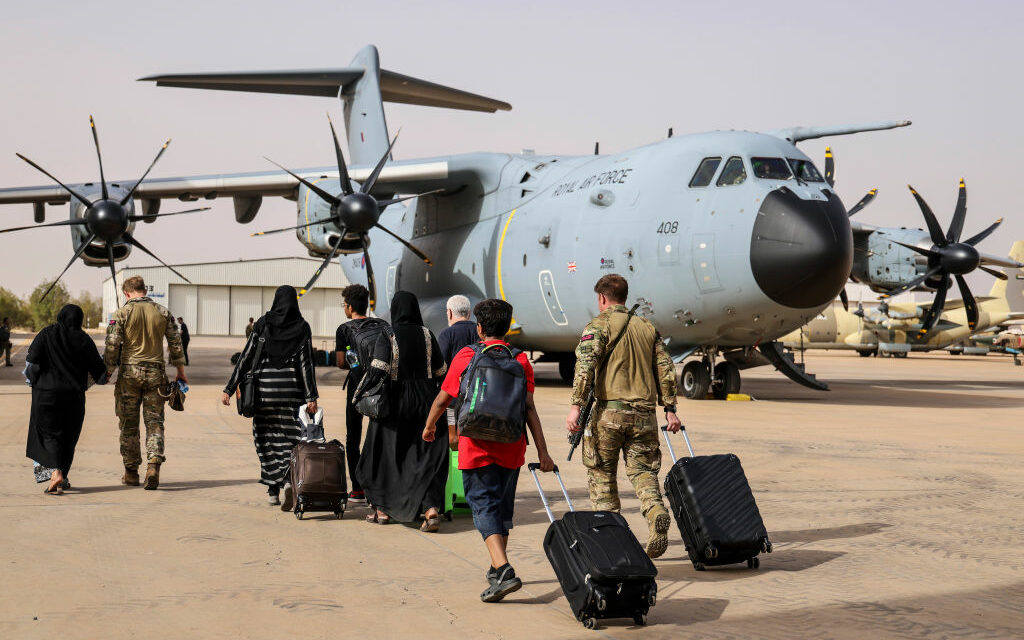
SUBSCRIBER+EXCLUSIVE INTERVIEW – Hundreds of Americans fled Sudan over the weekend in two convoys headed for port cities. The U.S. government led evacuations some two weeks after fighting between warring factions erupted in the country. Meanwhile, air strikes are continuing in the capital of Khartoum in the midst of a declared ceasefire. While the exact number of casualties is still not known, millions of people are believed to be trapped in the city.
In this exclusive Subscriber+Interview, The Cipher Brief spoke with Middle East Expert Norm Roule about what’s happening there and its broader impact on the region.
QUICK BACKGROUND
THE INTERVIEW
Norm Roule, Middle East & Energy Expert

Norman T. Roule is a geopolitical and energy consultant who served for 34 years in the Central Intelligence Agency, managing numerous programs relating to Iran and the Middle East. He served as the National Intelligence Manager for Iran (NIM-I) at the ODNI from 2008 until 2017. As NIM-I, he was the principal Intelligence Community (IC) official responsible for overseeing all aspects of national intelligence policy and activities related to Iran, to include IC engagement on Iran issues with senior policymakers in the National Security Council and the Department of State.
The Cipher Brief: The violence in Sudan appears to be escalating. What role is being played by diplomacy in what looks to be a fierce competition between two determined military opponents?
Roule: Three baskets of diplomatic actors have been working to halt the violence over the past few weeks.
First, we need to watch the work of the Trilateral Mechanism consisting of the United Nations, the African Union, and the Intergovernmental Authority on Development.
Next, is the Quad Group involving the United States, the United Kingdom, Saudi Arabia, and the United Arab Emirates.
Last, a number of individual states have a history of engagement with Sudan. Turkey, Egypt, and Qatar are all playing a role here. Kenya has also tried to help. The EU has reached out to urge a ceasefire. All of these parties have tried to avoid taking sides in the conflict. Russia and China are involved but haven’t been the leading players in Sudan-related diplomacy.
Although these countries are urging peace, the most significant diplomatic efforts appear to be coming from the Quad. These countries have routinely called for Sudan’s leaders to respect the country’s constitution and the 2020 Juba peace agreement. Since the outbreak of violence, which has been sharpest in the south of Sudan, diplomats have tried to forge cease fires, prevent the use of artillery against civilian centers, discourage fighting in Khartoum, and develop safe passage corridors to allow evacuees to reach Port Sudan. They seem to be having the most success regarding evacuation. Ceasefires are fragile at best and often successful in specific areas.
The progress achieved to date involved skill and – given the security environment – courage. Diplomats, military personnel, and civil authorities from multiple countries are coming together to respond to an evolving and likely long-term crisis. Those involved in this operation deserve our thanks and support in the coming weeks. We also need to thank those heroes who put themselves at risk during the exfiltration of U.S. embassy personnel. This exfiltration made many recall the 1991 evacuation of US personnel from Somalia.
The Cipher Brief: Is there any sign that the conflict may be contained?
Roule: Unfortunately, not. And the near-term future for Sudan looks grim and violent. Neither side in this fight has shown an interest in mediation. One goal of recent diplomacy was to restrain the Sudanese army from attacking Khartoum with heavy weapons to dislodge its adversaries, the Rapid Support Forces. In recent hours, air strikes and artillery have hammered targets in the city. The Central Bank is in flames.
There is little doubt that this conflict may only be in its early stages, with tragic consequences for the people of Sudan and the region. We should all pray that diplomacy is successful. Sudan has endured two bloody civil wars in the past, and each lasted for around two decades. It has taken hard work to reduce the presence of Iran, foreign militants, and terrorists in Sudan. The instability that would accompany a long-term conflict could reverse this success.
The Biden administration has spoken of its intention to focus more on Africa, in part to compete with China and Russia. The Gulf Arabs are strongly interested in a stable and prosperous East Africa. Sudan is an important source of agricultural products for Gulf countries. Serious thought should be given to marrying these various interests.
Are you a thought leader in national or cybersecurity? Apply now to attend The Cipher Brief’s 2023 Threat Conference October 7-10, Sea Island, GA
The Cipher Brief: The massive and complicated challenge of evacuation operations will likely continue over the coming days. How are you looking at the effort?
Roule: It will take some time to identify how many foreign nationals and dual citizens wish to leave the country, but it is already clear that the number will be in the tens of thousands. The United Nations estimates that 50,000 persons have fled Sudan to date. Thousands more are seeking a way out.
The past week saw several significant developments involving evacuations.
First, a handful of countries flew out some of their citizens and others before security conditions deteriorated. The most fortunate evacuees could depend on home countries with the resources, proximity, and experience to manage evacuations. Others have had no choice but to remain in place or travel as best they can to reach the Egyptian border or Port Sudan with its Saudi-enabled passage to Jeddah. Travel to Port Sudan takes at least 12 hours.
Next, Port Sudan has been established as an embarkation point supported in large part by the Saudi Navy and special forces. We also have the establishment of Jeddah as a complimentary consular hub to receive and process evacuees. Establishing each required working through logistic challenges involving multiple countries.
Finally, efforts have been undertaken to understand and improve the security situation of the land corridor from Khartoum to Port Sudan. This city has become a hub of UN officials, diplomats, and aid workers. The most challenging part was to understand and ensure the safety of the land corridor evacuees would use to reach the city. I suspect CENTCOM, AFRICOM, and NAVCENT have played a significant role here.
As is becoming clear, the Kingdom of Saudi Arabia is a critical element in this complicated process. In addition to offering its naval vessels to evacuees and to move diplomats to Port Sudan, it has arranged for accommodation and onward passage of refugees once they arrive in Jeddah. By all accounts, this effort – which probably involves several Saudi ministries – has been warmly received. Even Tehran thanked the Kingdom for facilitating the return of 65 Iranians.
We shouldn’t forget that the Gulf states took in thousands of Afghans during the withdrawal of international forces from that country. The strong performance by the Saudis – and Emiratis who have flown out evacuees to include Americans – serves as useful reminders of the importance of these partnerships. Qatari diplomatic cooperation should also be noted.
The Cipher Brief: Is there one aspect of the evacuation that has struck you as unusual or notable?
Roule: As I said, international cooperation has been good, and there is a story here that should be discussed later. The role of armed drones to surveil and safeguard the evacuation route to Port Sudan during a journey of around 500 miles and 20 hours may be a first. It shows how despite not having boots on the ground, we can use this emerging technology to overcome some challenges. This technology enabled the two convoys that traveled from Khartoum to safety. This will probably become standard practice in such events. At a time when we see Iranian drones used to kill innocents in Ukraine, it is good to watch this technology save lives in Sudan.
The Cipher Brief: What do you think about the criticism that the U.S. responded slowly while other countries were evacuating their citizens?
Roule: The world has plenty of armchair generals and no doubt there will be a chance for Congress and others to understand what could have been done better in the early days of this crisis. Questions should be asked about the diplomacy and intelligence picture during this time since it was clear that the two sides were moving towards conflict some days prior to the eruption of violence.
But it can’t be denied that while Britain, Germany, France, India, Turkey, and China initiated limited operations to withdraw their citizens, the administration announced that it had no plans for a broad pull out of Americans. Indeed, the Biden administration didn’t want to see a repeat of the sometimes-chaotic Afghan withdrawal.
In fairness, we will need more time to understand the events of these early days. The administration claimed it undertook the difficult job of contacting the 16,000 known Americans in the country to see if they sought withdrawal; reportedly, the initial number seeking such support was small. The administration also helped Americans get seats on aircraft from other countries. We owe the UAE and Britain special thanks here. We should also recognize that the security situation that enabled withdrawals from Sudanese airbases quickly deteriorated as these locations were attacked by opposing sides. I think the Turks claimed that their aircraft came under direct fire.
At some point, we need a bipartisan position on evacuations. What is a reasonable evacuation requirement for any administration that involves a distant location, thousands of nationals from dozens of countries, and a deteriorating and, at best unpredictable security environment? Such evacuations have not been considered traditional responsibilities; the Afghan withdrawal may have created a new view. If we seek to increase our capabilities in this area, what will it require to distribute intelligence and military assets globally, especially in regions with histories of instability but with few U.S. strategic interests?
Looking for a way to get ahead of the week in cyber and tech? Sign up for the Cyber Initiatives Group Sunday newsletter to quickly get up to speed on the biggest cyber and tech headlines and be ready for the week ahead. Sign up today.
The Cipher Brief: What about the role of Russia and the Wagner Group?
Roule: Russia will have difficulty sitting out this conflict, but its influence is likely limited. Africa has become a significant target of its foreign policy. Sudan is important for several reasons. Russia has long cultivated relationships with its military and continues to hope to establish a naval logistics base in Port Sudan. The planned base would allow it to berth four vessels, including nuclear power submarines. This capacity would allow it to avoid resupply trips to the Mediterranean and extend submarine operations in the Arabian Sea and Indian Ocean. Sudan is also an important source of gold. These imports have taken on greater significance since the imposition of international sanctions to sustain Russia’s finances.
Yevgeny Prigozhin’s Wagner Group has served as Russia’s official surrogate in Sudan. Prigozhin reportedly recently offered to facilitate talks between Sudan’s warring factions. Only last week, Russian Foreign Minister Lavrov asserted that Sudan had the right to seek assistance from the Wagner Group.
The Wagner Group’s history in Sudan has focused on gold mining since at least 2017. Using the company Meroe Gold, Prigozhin exploited Sudan’s gold resources while providing weapons and training to Sudan’s military. Recently, reports indicated that Wagner favors Sudan’s Rapid Support forces, possibly providing surface-to-air missiles via Libya and Syria. We should expect Wagner involvement to continue, although direct fighting by Wagner forces is unlikely on any large scale, given the demands of Ukraine operations.
The Cipher Brief: What’s at stake for China in Sudan as fighting drags on?
Roule: Sudan is an important export market for Beijing and Khartoum’s second-largest trading partner. China has invested heavily in Sudan’s oil industry, filling the gap left by Western firms forced to leave the country when terrorism sanctions were imposed on Khartoum in the 1990s. China has also invested in Sudan’s mining sector. Press reports estimate that around 1,500 Chinese citizens lived in Sudan when the latest crisis began.
The Cipher Brief: Aside from the humanitarian and geopolitical costs of any conflict in Sudan, what are the West’s economic interests here? Will the conflict impact the oil market?
Roule: First, let’s talk about oil. Sudan is not a significant oil producer and is the smallest of the OPEC-plus producers. Its output averages around 60,000 barrels per day which is sent mainly to India, China, and Malaysia. However, any production loss in light of recent cuts will be noticed. Thus far, South Sudan’s oil production of just under 170,000 barrels a day continues to flow normally. South Sudan’s exports are carried through a 900-plus-mile pipeline that crosses Sudan to Red Sea tankers. As time passes and even if the pipeline remains untouched, South Sudan will probably need to reconfigure its supply chain to obtain equipment that formally came from its northern neighbor.
Next is a less well-known commodity. It will likely surprise most of your readers, but there is a commodity from Sudan that they probably consume or use several times every day: gum Arabic. Derived from the sap of the acacia tree, gum Arabic has been used since ancient times as a medicine but, in the modern era, is a key edible emulsifier; that is, it keeps ingredients from separating. The number of products that require this little-known substance is surprisingly large. From soft drinks to cosmetics, candy, and paints to pharmaceuticals, shoe polish to the adhesive on envelopes. The leading producers are in the dry savannahs across the Sahel region of Africa. Acacia production statistics aren’t always reliable, but Sudan is responsible for around two-thirds of gum Arabic exports, followed by Chad, Nigeria, and Mauritania at much smaller levels. Most exports land in France or India for re-export worldwide. Its importance to so many industries is such that it has been one of the items often unsanctioned when economic pressure is taken against producer countries.
Read more expert-driven national security insights, perspective and analysis in The Cipher Brief because National Security is Everyone’s Business.
Related Articles

SUBSCRIBER+ EXCLUSIVE REPORTING – Afraid to show his face and wedged into an overstuffed refugee camp on Sudan’s border with Chad, a middle-aged man named […] More
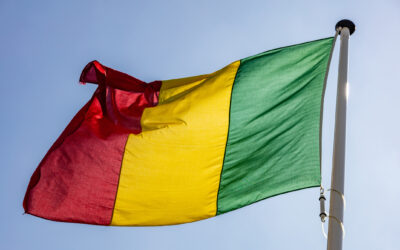
CIPHER BRIEF REPORTING — As the Mali government grapples with political turmoil, a splinter faction of the militant group ISIS, known as ISIS-GS or ISIS in the […] More
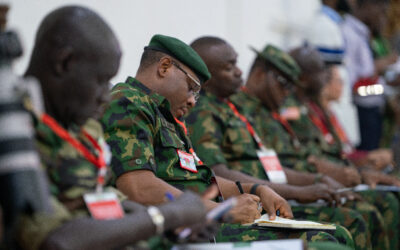
EXCLUSIVE SUBSCRIBER+ INTERVIEW – The former head of Gabon’s presidential guard has been sworn in as the country’s new president, just days after a military-led […] More
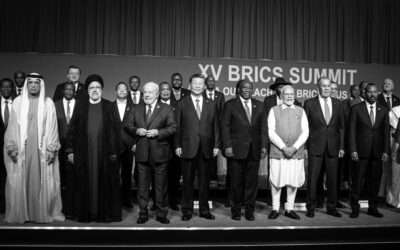
SUBSCRIBER+ EXCLUSIVE INTERVIEW – If there were an indicator of what a new world order could look like, it was likely on display during last […] More
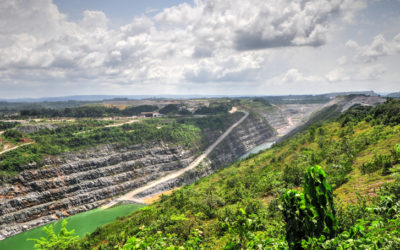
A rarely discussed but high impact trend that seems to have been amplified by the COVID-19 virus is affecting investment in countries that have traditionally […] More

The Cipher Brief’s Open Source Trend Line Report utilizes open source data on a quarterly basis to track trends around the world that impact national and global […] More
Search